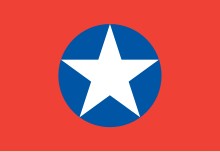Việt Nam Quốc dân Đảng
The Việt Nam Quốc dân Đảng (abbreviated VNQDD , French Parti nationaliste vietnamien , German Vietnamese Nationalist Party ) was a political party in Vietnam .
history
The organization was founded in November 1927 in Hanoi by Nguyễn Thái Học . Ideologically, she leaned against the Kuomintang of Sun Yat-Sen . It publicly propagated its three principles of nationalism, democracy and people's welfare. The aim of the organization was an independent Vietnam free from French colonial power. This goal can only be achieved through an armed uprising. The organization quickly attracted several hundred militants in Tonking and began in 1929 with attacks on the French military and security forces, especially members of the Sûrete security service . The murder of a French recruiter for plantation workers in Saigon in 1929 triggered a wave of arrests in which around 1,000 alleged and actual nationalists were arrested.
In February 1930 the VNQDD tried to break up a general uprising by taking over the garrison of the city of Yên Bái . 40 defected soldiers and 60 guerrillas killed the five French officers and NCOs of the garrison. However, none of the other 550 local soldiers wanted to join the insurgents. The revolt was put down within hours. On June 17, the founder Nguyen Thai Hoc, arrested after another attempt at insurrection, was executed by the French.
The press in the colony and the motherland described the suppression of the rebellion as brutal, including the destruction of villages by means of air strikes. The French journalist Louis Roubaud described in his report in book form Viet-Nam - La Tragédie Indochinoise in 1931 the motives of the rebels as republican nationalists competing with France, contrary to the official narrative, which sought to classify the rebels as communists or simply bandits. The repression of the revolt led to PCF- supported demonstrations in Paris against colonial rule in Indochina.
After the invasion of Kuomintang troops in the wake of the Japanese surrender , the VNDQQ received support from the Chinese occupation authorities. After this withdrawal, the VNQDD was increasingly decimated and ousted by the Viet Minh . Numerous VNQDD members also joined the Viet Minh.
The party continued to exist and took part in elections in the Republic of Vietnam . After the reunification of Vietnam in 1976 it was banned; it still persists among Vietnamese abroad.
Individual evidence
- ↑ a b Pierre Brocheux, Daniel Hémery: Indochina. An ambiguous colonization, 1858–1954 (= From Indochina to Vietnam. Vol. 2). University of California Press, Berkeley CA et al. 2009, ISBN 978-0-520-24539-6 , p. 309.
- ↑ Fredrik Logevall: Embers of War. The Fall of an Empire and the Making of America's Vietnam. Paperback edition. Random House, New York NY 2013, ISBN 978-0-375-75647-4 , p. 151, pp. 17-18.
- ↑ Pierre Brocheux, Daniel Hémery: Indochina. An ambiguous colonization, 1858–1954 (= From Indochina to Vietnam. Vol. 2). University of California Press, Berkeley CA et al. 2009, ISBN 978-0-520-24539-6 , pp. 314-316
- ^ A b Geoffrey C. Gunn: Rice Wars in Colonial Vietnam. Lanham, 2014, pp. 61-63
- ↑ Christopher Goscha: Vietnam - A New History. New York, 2016, p. 136
- ↑ Fredrik Logevall: Embers of War. The Fall of an Empire and the Making of America's Vietnam. Paperback edition. Random House, New York NY 2013, ISBN 978-0-375-75647-4 , p. 151, p. 259.
